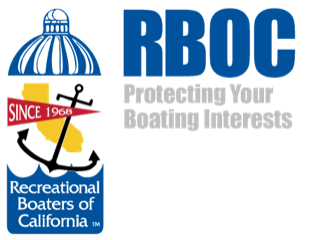RBOC and our national advocacy partner BoatU.S. are engaged with the coalition of national and state organizations representing sportfishing, boating, fishing tackle manufacturers, marine organizations, harbor authorities and retailers that are rushing to the defense of California sportfishing and whale watching boat owners. Today’s press release:
State and National Sportfishing and Boating Organizations Send Up Flares
California’s proposed engine emission regulations could undermine recent gains in fishing participation rates, conservation funding and economic activity
(San Diego, CA): With just weeks before the California Air Resources Board (CARB) is expected to rule on controversial harbor craft engine emission regulations, a coalition of national and state organizations representing sportfishing, boating, fishing tackle manufacturers, marine organizations, harbor authorities and retailers are rushing to the defense of California sportfishing and whale watching boat owners.
In the coalition’s letter to the CARB Board, the coalition expresses concerns associated with engine emission regulations that are economically and structurally infeasible for commercial passenger boats that provide millions of Californians and foreign visitors access to sportfishing, whale watching, eco-tourism and scuba diving. By CARB’s own admission, if the regulations are adopted, boat owners that can’t afford to construct and purchase new compliant vessels that can house the mandated heavier Diesel engines and equipment would be required to go out of business as early as January 2023.
The letter highlights that during the COVID-19 pandemic the Nation experienced a surge in fishing participation that include diverse audiences, specifically, nontraditional participants that are younger, more urban, and more diverse with significant gains among women, African Americans, and Hispanics. The coalition is concerned that as passenger sportfishing boats are removed from service or passenger ticket prices are increased to pay for regulatory costs, it will only undermine recent progress made by the California Department of Fish and Wildlife (CDFW) to increase fishing participation and license sales that fund the department’s conservation and fishery programs. California’s fishing participation rate (per capita) is the lowest in the Nation, demonstrating how fragile the recent increase in participation may be if CARB rules make it unaffordable.
“CARB’s regulations will have the unintended consequence of denying millions of Californians access to the sea as commercial passenger boat owners go out of business,” said Ken Franke, president of the Sportfishing Association of California. “CARB fails to recognize that passenger boats are a valued source of outdoor recreation and economic activity in California. For most Californians, these boats are their only access to offshore sportfishing and marine life.”
Additionally, CARB failed to consult with the CDFW to determine what impact declining fishing participation rates could have on conservation and fishery programs, both offshore and inland. Both fishing license sales and a federal excise tax on fishing tackle and boat fuel fund many of CDFW’s environmental programs with the Federal Government matching $3 for every state dollar contributed.
“When California’s 2 million anglers fish off one of the Nation’s longest coastlines, they buy fishing licenses that fund conservation and fishery programs that protect local habitat,” said Franke. “Unfortunately, CARB did not evaluate the environmental and economic impact of regulations that will have a devasting impact on sportfishing and eco-tourism all along California’s coast.”
Additionally, CARB’s Standardized Regulatory Impact Assessment failed to examine the economic impacts on coastal tourism and outdoor retail sales at a time when Governor Gavin Newsom has made it his priority to restore the half of 1.2 million hospitality and tourism jobs lost during the COVID-19 pandemic.
CARB’s regulations have invited bipartisan opposition from State Legislators and a coalition of over 60 local, state and national organizations representing small business, tourism, marina/harbors, local agencies, retail, non-profits, boating and sportfishing. In addition, over 20,000 anglers signed a petition pleading with Governor Newsom to Save Our Boats.
Background
On September 21, 2021, CARB released its Proposed Amendments to the Commercial Harbor Craft Regulation. The public comment period is September 24 – November 15th, and the CARB Board, appointed largely by Governor Gavin Newsom, is expected to rule November 19, 2021. Over 1,700 public comments have been submitted to CARB so far.
CARB’s regulations require engines to be modified with technology that has not been developed yet for 174 commercial inspected passenger fishing vessels and in most cases, the modifications will be too massive to fit into existing engine rooms. This led the California State University Maritime Academy to conclude that the proposed standards for existing engines does not exist and in the alternative, “… treatment equipment (modifications) alone significantly impacts the vessel’s stability.” This led CARB to conclude vessel replacement is likely.
California is one of America’s premiere fishing destinations with over a half a million people a year fishing from sportfishing boats, supporting coastal communities, marinas, and small businesses dependent on outdoor tourism for economic activity, jobs, and tax revenue. Prior to the COVID-19 pandemic, California’s over 2 million anglers contributed $5.6 billion a year in economic activity and supported nearly 40,000 jobs for our State.
Between 2019-2020, California fishing license sales increased 19 percent, bringing in an additional $12.6 million in revenue for California Department of Fish and Wildlife programs.
The Recreational Boating and Fishing Foundation reports that in 2020 fishing participation rates increased to a 12-year high, with growth among nontraditional participants that are younger, more urban, and more diverse, with significant gains among women, African Americans, and Hispanics.
The Sportfishing Association of California (SAC) is a trade organization representing Southern California sportfishing and whale watching boat and landing owners. The Golden State Fishermen’s Association represents commercial passenger fishing vessels and marine recreational anglers in Northern California.


